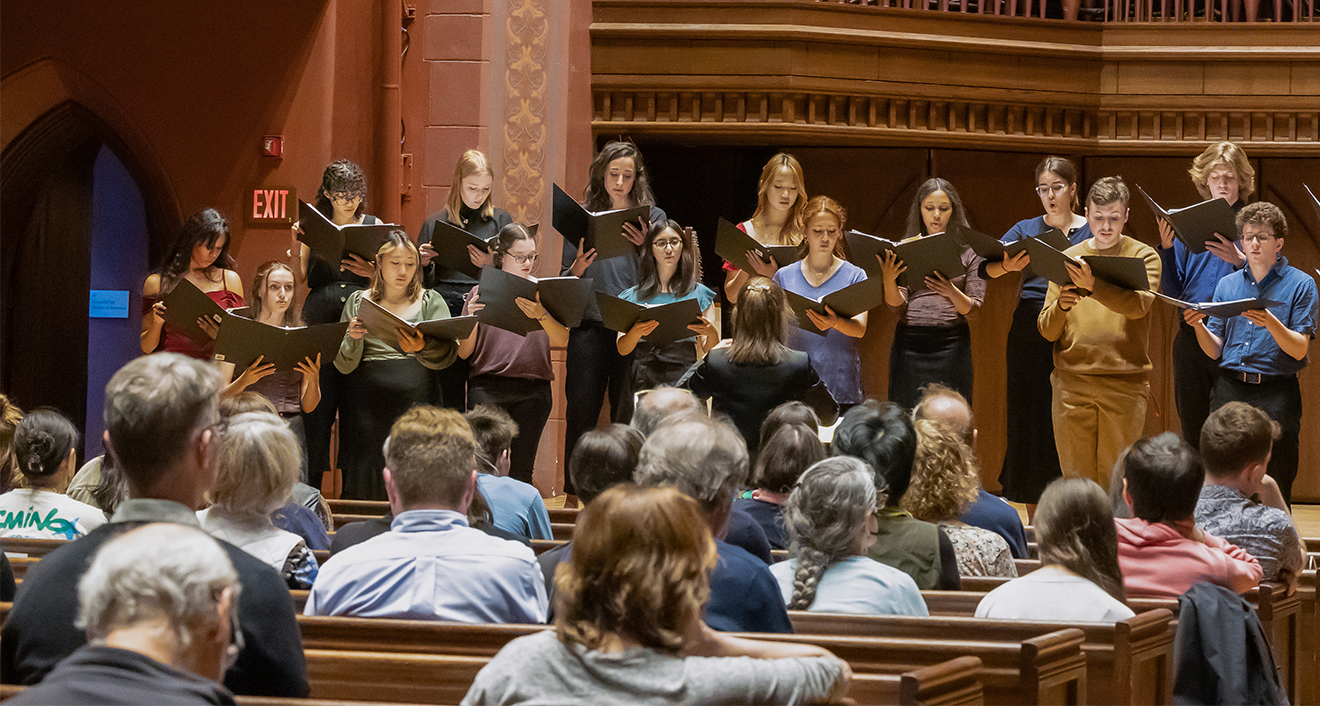
New Works from Renowned Composer to Debut at Spring Concert

For composer Jlin (Jerrilynn Patton), the different worlds of music genres, from classical to electronic, are closely related. “They're not different—they really aren't,” Jlin said. “And I like to show people they are very much the same family.”
“It’s a love language,” said Jlin, a finalist for the 2023 Pulitzer Prize in Music. “That is the highest form of vibration. If none of us spoke each other's language, we can make music together and it would be beautiful. I take all that into account every time I write a piece.”
On May 3, the Wesleyan Javanese Gamelan Ensemble, under the direction of Winslow-Kaplan Professor of Music Sumarsam MA ’76 and University Professor of Music Harjito, will present a spring concert of the classical music and dance of Central Java, featuring the world premiere of two works by Jlin that were commissioned by the Center for the Arts (CFA). The first, Sovereign, will be performed live by the Javanese Gamelan Ensemble; and the second, Jlin's electronic composition Fluidity, will feature members from Wesleyan's Toneburst Laptop and Electronic Arts Ensemble, under the direction of Professor of Music Paula Matthusen, in Jlin’s first collaboration with a laptop ensemble. The concert will also include Visiting Assistant Professor of Dance Dewati Rahmayani from the Royal Palace of Yogyakarta.
CFA Director Joshua Lubin-Levy ‘06 and Associate Director for Performing Arts Fiona Coffey went to MASS MoCA (the Massachusetts Museum of Contemporary Art) to see Jlin’s work-in-progress installation Akoma (which is Ghanaian for “the heart”) in February 2023. Jlin released the album Akoma in March 2024, featuring collaborations with Philip Glass, Björk, and the Kronos Quartet. “I specifically want my next album to be focused on acoustic music,” Jlin said. “So that’s where you all come in to help. Everything that I do is a practice moment.”
Coffey started to plan Jlin’s residency in June 2023. “When we mentioned we had a gamelan at Wesleyan, Jlin’s eyes lit up,” Coffey said during Jlin’s exploratory visit to campus in December 2023. “It was exciting to offer Wesleyan's unique resources to help Jlin develop this new work.” Since 1983, Wesleyan has owned a set of gamelan instruments—including bronze gongs and metallophones, wooden xylophones, drums, and bowed- and plucked-string instruments—from Yogyakarta, Indonesia, which were donated to the University by Louise Ansberry.
Jlin first heard the sounds of a gamelan when she was in elementary school in Gary, Indiana. “I never heard anything like that before,” Jlin said. “It did something to my body when I first heard it, almost like your first spiritual awakening of some sort. I just gravitated to that sound and it made me long to try to find that sound again.”
Jlin visited Sumarsam‘s courses MUSC 451 “Javanese Gamelan—Beginners" and MUSC 452 “Javanese Gamelan—Advanced" to listen to the gamelan sounds, and Matthusen’s MUSC 109 “Introduction to Experimental Music” to start to build connections with faculty around her research. “I think this is the start of a beautiful relationship,” Jlin said. “Everybody is just amazing—it's so harmonious.”
“This is the way I work all the time,” Jlin said of that initial visit. “If I can record sounds from this gamelan, that would be great. There are so many possibilities.”
During the summer of 2024, Jlin, Sumarsam, and Harjito collaborated to record the individual sounds of each instrument of the gamelan—both for use in Jlin’s work, and to create the first open-access digital library of Wesleyan’s gamelan sounds.
Over the course of the 2024–2025 academic year, Jlin worked on the creation of her two commissioned compositions using those digital recordings. Library Assistant and Music Outreach and Collections Assistant Jennifer Hadley ‘84, MA ‘86 had helped map all the sounds of the instruments onto a spreadsheet, which Jlin studied before she started to write the acoustic work Sovereign. Graduate music student Ethan Schwartz assisted Jlin with the notation. “I never dictate any of my works,” Jlin said. “So, they would be free to interpret it however they choose.”
Jlin went to the second Wesleyan Javanese Gamelan Ensemble rehearsal of Sovereign earlier this month. “Their chemistry in the advanced gamelan class is insane — it's just unmatched,” Jlin said of the Wesleyan students rehearsing her piece. “I'm like ‘y'all need to be a group and like go on tour.’”
Jlin also visited Matthusen’s class MUSC 103 “Materials and Design,” which examines how musical notational and theoretical practices are often encoded in digital audio workstations, and presumes no prior musical knowledge or training. At the start of this spring semester, Matthusen had played Jlin’s Akoma track "The Precision of Infinity" featuring Philip Glass for the students. That morning, the class heard other works by Grandmaster Flash, Paul Hindemith, and Herbie Hancock. “I cannot read music, so everything that I do is by intuition,” Jlin told the class. She taught herself the digital audio software FL Studio while she was an undergraduate at Purdue University. “I feel like I'm constantly in the state of learning.”




